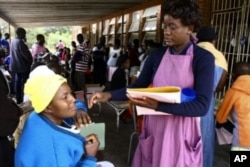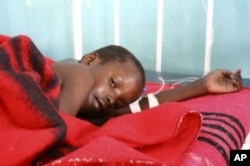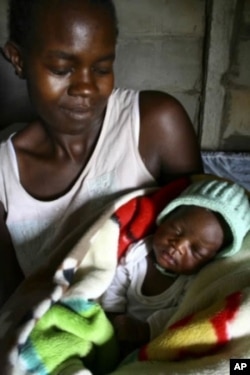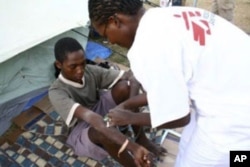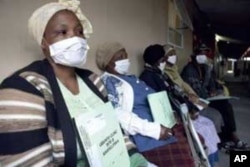An international aid organization is warning that the deportations of thousands of Zimbabwean migrants from South Africa will pose serious public health risks. Medecins Sans Frontieres (MSF) says mass expulsions could also endanger the lives of many migrants, including some who suffer from potentially fatal conditions, such as HIV and tuberculosis.
MSF, or Doctors Without Borders, provides health care to vulnerable populations – including refugees, migrants and HIV-positive people – in regions in crisis around the world.
Under new immigration laws in South Africa, only Zimbabweans who are able to prove they’re working or studying or who own businesses in the country will be able to stay there legally. The government says they must apply for the new residence permits by December 31. If their applications are refused, they could be deported beginning early next year.
NGOs say there are up to two million Zimbabweans living illegally in South Africa, following a decade of economic and political chaos in their homeland.
Potential for death
The MSF field coordinator in Johannesburg, Sara Hjalmarsson, says most Zimbabweans treated by the organization in South Africa are destitute. “They don’t have proper jobs; they’re not studying; they don’t have businesses – and so technically they don’t qualify for the new residence permits. Therefore there is a big risk they’ll be deported.”
MSF, says Hjalmarsson, is “not pleased” about this. “We hoped that the authorities would find some way to include the most vulnerable people in this documentation project. But at the moment, it’s only the more privileged migrants who have the chance of getting legal status and remaining in South Africa,” she says.
The coordinator adds that MSF’s “big fear” now is that if the deportations are carried out, migrants who fear being expelled are going to “go underground…. Their fear of arrest will prevent them from seeking health care at public facilities.”
Hjalmarsson says this scenario holds “many negative consequences” for individuals, as well as for society as a whole. “We saw that during the last cholera outbreak (in 2008). Deportations were ongoing so people didn’t dare to seek health care, which of course leads to a very big public health risk,” she says.
If HIV-infected Zimbabwean migrants are expelled, she explains, the antiretroviral (ARV) treatment they’re currently getting in South Africa will be interrupted. “Their immune system will be very negatively affected by this. And they will risk getting more sick.”
ARVs, when taken according to strict guidelines, boost the immune systems of HIV-infected people, protecting them from potentially fatal sicknesses and prolonging their lives. But, if the drugs aren’t taken properly, or if treatment is interrupted, patients develop resistance to the ARVs and the medicine is no longer effective.
“These people could then die,” says Hjalmarsson, “but it also means the HIV-infected migrants could spread the virus to others because there’s a much higher risk for HIV being spread when you’re not on HIV treatment.”
She says she doubts that sick migrants will have access to good health care if they’re deported next year. “That depends on the current situation in Zimbabwe, which can also change both to positive and negative. We are worried that it will change more to the negative, with (proposed) elections in 2011,” Hjalmarsson says.
Previous polls in Zimbabwe have been tainted by widespread political violence and a corresponding decline in the quality of health care.
“These (migrants) will suffer if they are deported, there is no doubt about that, and certainly the potential is there for many of these people to get really, really ill and perhaps even eventually die,” says Hjalmarrson.
Many barriers to health care
MSF says its aim is not to treat all the migrants, but to “integrate” them into South Africa’s public health care system by referring them to the country’s state medical facilities…a task that Hjalmarsson says has become “more and more difficult” in recent years.
“Access (to) health care in South Africa is not at all easy, especially if you are a foreigner. So people do not seek health care as they should, which ends up that (they) get very sick before (they) seek treatment.”
According to South African law, illegal immigrants should not be barred from receiving health care at government clinics and hospitals. But in practice, says MSF, there are “a lot of barriers” preventing the migrants from accessing public health care in South Africa.
Hjalmarsson says some doctors and nurses in the country’s clinics refuse to speak English. “They just speak local languages to exclude any foreigners,” she says. “And so these foreigners are forced to leave without any treatment.”
Also, she adds, South African health care workers sometimes demand cash payments from migrants, even though public health care is free in the country.
“There just seems to be great animosity by medical staff towards foreigners,” Hjalmarsson says. “Just a general bad attitude of staff, a lot of comments (like) ‘We are tired of treating foreigners; go back to your country; the medicine is for South Africans and not for you.’”
Conditions in Johannesburg ‘worse than refugee camp’
As thousands of Zimbabweans living in South Africa scramble for the new residence permits, MSF continues to treat many sick and injured migrants at its clinics in the country. “We started the project because there was a big influx of especially Zimbabweans coming into South Africa, and they have minimal access to health care,” says Hjalmarsson.
Most of the migrants settle in South Africa’s largest city, Johannesburg, where MSF operates a primary health care clinic for them. “We provide consultations and referrals to hospitals for treatment and referrals to clinics for HIV treatment,” Hjalmarsson explains.
0MSF says the health of Zimbabweans living in Johannesburg is under constant threat. Hjalmarsson says, “We have identified about 80 buildings (in the inner city). We call them slum buildings, because most of them (offer) appalling living conditions with often no waste management, no running water, no electricity; very small living space per person; many, many people in a very small room. These places are very far below the internationally accepted standard of even what a refugee camp should look like.”
She says most illnesses suffered by the migrants – including HIV, TB, serious diarrhea, respiratory tract infections and skin diseases – are “closely linked” to these “terrible” living conditions.
Rape and HIV on the border
Since 2007, MSF has been treating migrants at Musina, the border town that’s the main entry point for the the many Zimbabweans streaming into South Africa.
Hjalmarsson says, “Most people at that time were coming illegally over the border and were often beaten up or robbed and raped by the so-called ‘Goma Gomas,’ who are criminals who prey on people.”
She says this is still happening. “In Musina there are still very high numbers of rape cases while these migrants are crossing the border,” Hjalmarsson says.
In the border region, many Zimbabweans work on farms. “These migrants and seasonal workers have no access to health care, and especially no access to ARVs and other chronic treatment. So MSF is providing mobile clinics to these farms, where we go once a week to supply this treatment,” Hjalmarsson says.
If these “extremely vulnerable” people are deported, she adds, it’s “quite possible” that they won’t receive any health care in Zimbabwe and their lives will be “quite seriously threatened.”




